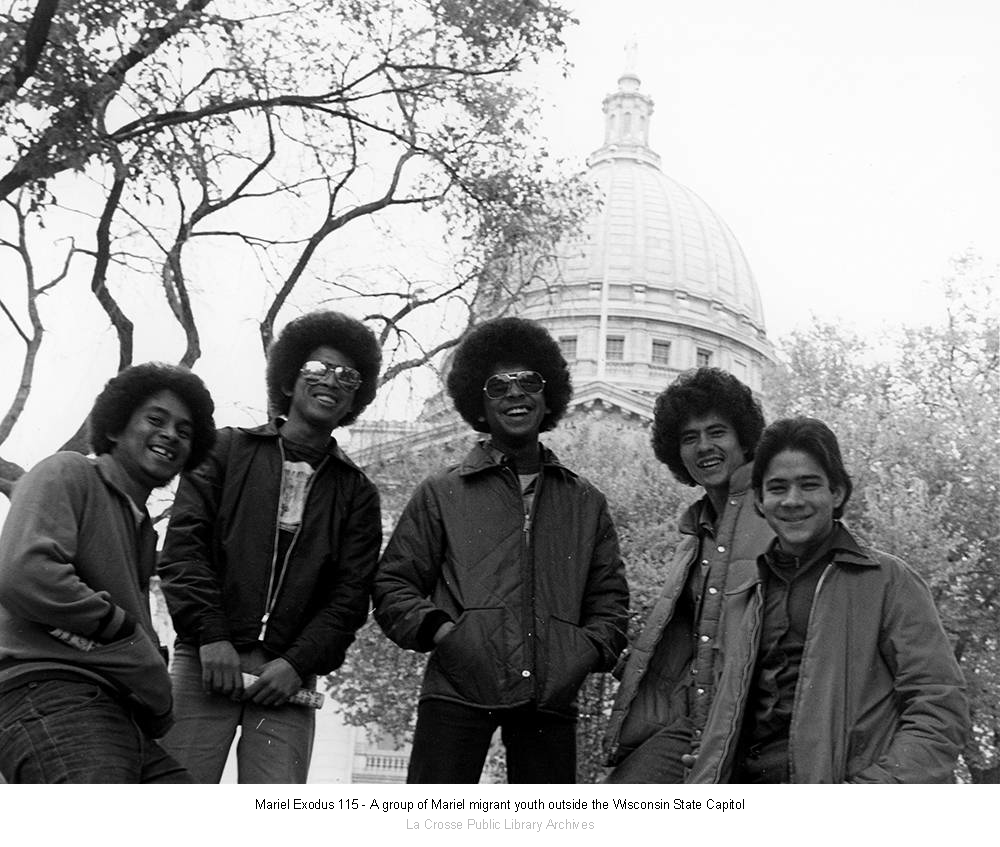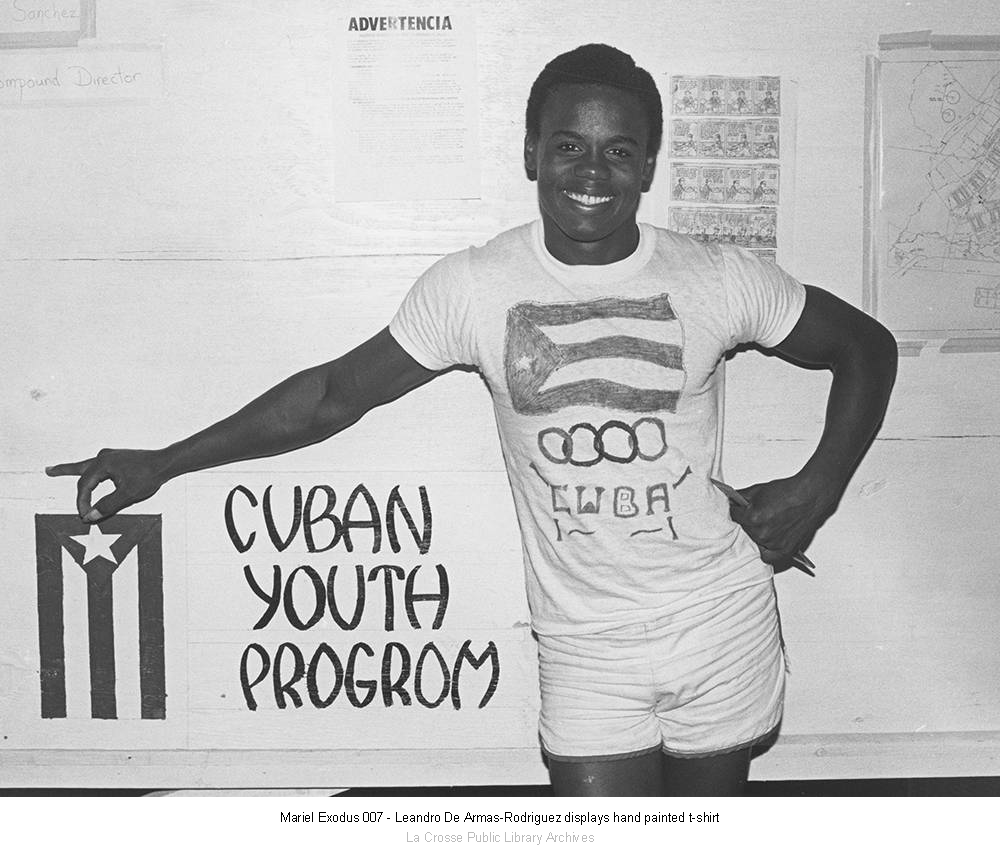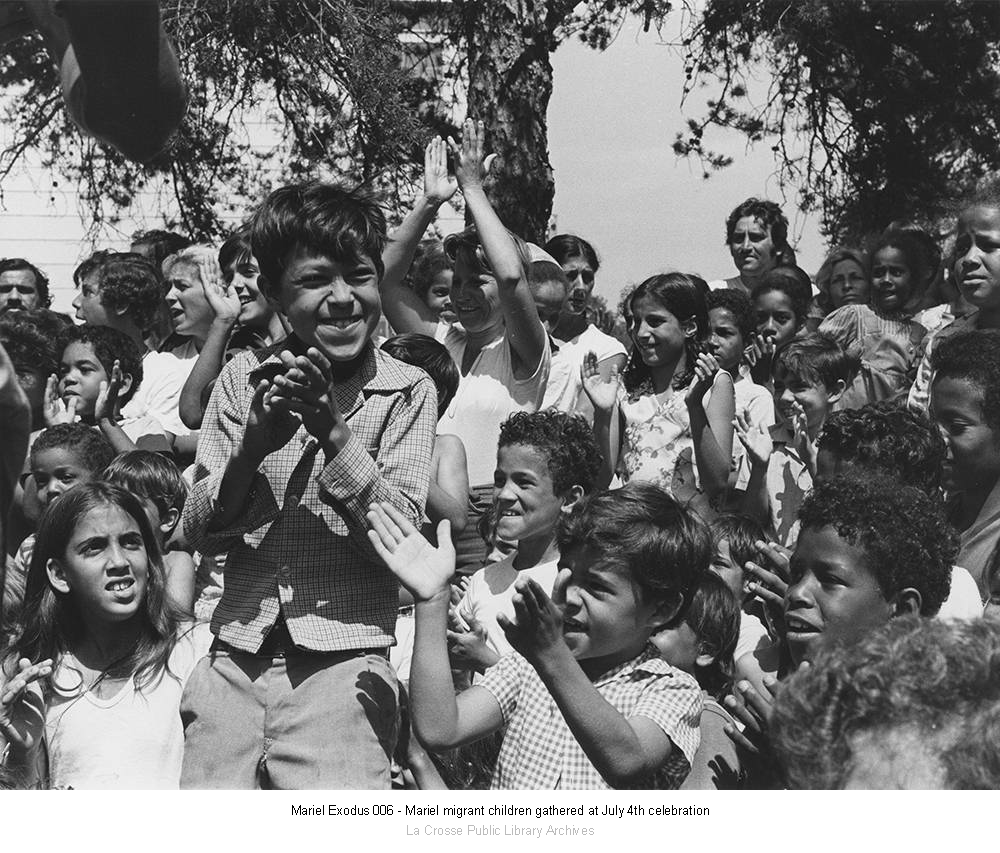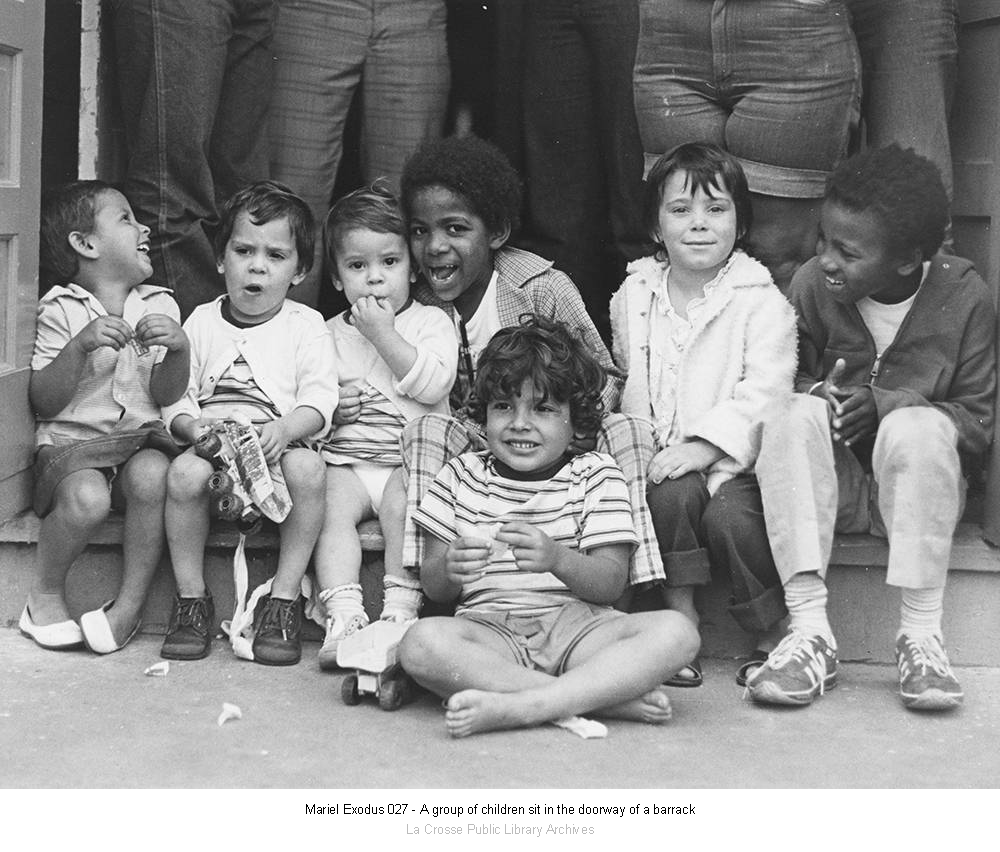
The Children of Mariel / Los niños del Mariel
As “entrants,” also with a pending immigration status, Cuban unaccompanied minors arriving at Fort McCoy could not be adopted by American families. Their custody was awarded to the INS and their guardianship was transferred to the State of Wisconsin Department of Health and Social Services. Public defenders were assigned to each minor, and a team of Cuban American psychologists was brought into Fort McCoy to provide assessments. A total of 145 unaccompanied minors (between the ages of 14 and 18) lived at Fort McCoy. Only four were women, only 46 had completed 10th grade, and 116 had been detained in Cuba at some point. In fact, 46 of those minors had come directly from juvenile detention centers in Cuba. Out of this group at Fort McCoy, only 19 minors were reunited with their relatives in the U.S. The other 79 of the 145 were assessed to be placed in foster homes immediately.
Los menores cubanos no acompañados, que también tenían un estatus migratorio pendiente, no podían ser adoptados por familias norteamericanas. Su custodia fue otorgada al INS y su tutela fue transferida al Departamento de Salud y Servicios Sociales del Estado de Wisconsin. Se asignaron defensores públicos a cada menor y un equipo de psicólogos cubanoamericanos vino a Fort McCoy para realizar evaluaciones. Un total de 145 menores no acompañados (entre 14 y 18 años) vivían en Fort McCoy. Solo 4 eran mujeres, solo 46 habían completado el décimo grado y 116 habían estado detenidos en Cuba en algún momento. De hecho, 46 de esos menores habían venido directamente de centros de detención juvenil en Cuba. De este grupo en Fort McCoy, solo 19 menores se reunieron con sus familiares en los EE. UU. Otros 79 de los 145 fueron evaluados para ser ubicados en hogares de acogida de inmediato.
Minors had been incarcerated in Cuba where the “Ley contra la vagancia” (Cuban Loafing Law) or “Ley de peligrosidad” (Law of dangerousness,) both of 1971, allowed police to make arrests based on looks. Many adolescents had committed a minor crime in Cuba to avoid being drafted into the Cuban army for a mandatory 3-year period.
Algunos menores habían sido encarcelados en Cuba, donde la Ley contra la vagancia y la Ley de peligrosidad, ambas de 1971, permitían a la policía hacer arrestos basados en apariencias físicas. Muchos adolescentes en Cuba cometían un delito menor para evitar ser reclutados en el ejército por un período obligatorio de 3 años.
With the closing of Fort McCoy on November 3, 1980 the remaining 84 unaccompanied minors were moved to a summer camp facility at Wyalusing State Park, in Praire du Chien, in Wisconsin. The facility was run by the State of Wisconsin Department of Health and Social Services and stayed opened until December 8, 1980. In Spring of 1981, an organization called the United Migrant Opportunity Service was contracted by the State of Wisconsin to set up an independent living program for Cuban minors who were 17 or older. The program was optional and provided supervised apartment living, clothing, placement services, high school education, medical and dental coverage and some vocational training including English as a second language. Many young Cubans actually left their foster homes to join this program, which provided them with services until the 19th birthday.
Con el cierre de Fort McCoy el 3 de noviembre de 1980, los 84 menores no acompañados que se encontraban en espera fueron trasladados a un campamento de verano en el Parque Estatal Wyalusing, en Praire du Chien, Wisconsin. El centro estaba a cargo del Departamento de Salud y Servicios Sociales del Estado de Wisconsin y permaneció abierto hasta el 8 de diciembre de 1980. En la primavera de 1981, una organización llamada United Migrant Opportunity Service fue contratada por el Estado de Wisconsin para establecer un programa de vida independiente para menores cubanos de 17 años o más. El programa era opcional y proporcionaba alojamiento supervisado en un apartamento, ropa, servicios de colocación, educación secundaria, cobertura médica y dental y algo de formación profesional, incluido el inglés como segunda lengua. Muchos jóvenes cubanos dejaron sus hogares de acogida para unirse a este programa, que les proporcionaba servicios hasta que cumplían 19 años.
Last Updated Date
The La Crosse Public Library welcomes patron participation and comments on the La Crosse Public Library’s social media and in our online forums. All LPL online sites are governed by general rules of respectful civil discourse. Individual patrons are fully responsible for everything that they post.
The La Crosse Public Library does not discriminate against any views. However, we reserve the right to remove content that violates the below rules, without consent. We do not verify the identity of participants.
- The Library will remove:
- Off topic contributions
- Content that contains obscenity, nudity, defamation or hate speech (Speech that targets people or groups based on race, ethnicity, religion, gender, or any other protected status).
- Content that threatens to harm individuals, groups, or organizations
- Spam and content that promotes services or products, or that involves political campaigning or lobbying.
- Comments that give the appearance of legal, medical or financial advice.
- The Library may remove
- Content that contains personal information (whether your own or someone else's), including home address, home or cell phone number, or personal e-mail address, in order to protect privacy.
- Gratuitous links to sites.
- Repeat submissions of the same (or very similar) contributions will be viewed as spam and may result in the content being removed.
- The Library will only post content from participants over 13 years of age.
- Communications made through social media posts, e-mail, webinars, and messaging systems will in no way constitute a legal or official notice or comment to the La Crosse Public Library or any official or employee of the Library for any purpose.
- All user-generated content is released into the public domain unless the participant clearly states otherwise,
- Users who do not comply with these standards of conduct may be blocked.
Disclaimer for links posted on our Website or Social Media
External links are being provided as a convenience and for informational purposes only; they do not constitute an endorsement or an approval by the La Crosse Public Library of any of the products, services or opinions of the corporation or organization or individual. The La Crosse Public Library bears no responsibility for the accuracy, legality or content of the external site or for that of subsequent links. Contact the external site for answers to questions regarding its content.
Reviewed and approved by Library Board, November 2021





